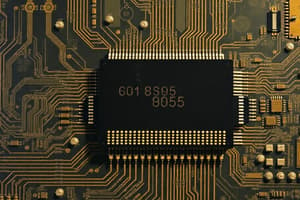Podcast
Questions and Answers
What is the opcode for the instruction ADD M?
What is the opcode for the instruction ADD M?
- C6
- 86 (correct)
- 3E
- 78
What is the opcode for the instruction MVI A, 7FH?
What is the opcode for the instruction MVI A, 7FH?
- 86
- C6
- 78
- 3E (correct)
What is the opcode for the instruction JMP 9050H?
What is the opcode for the instruction JMP 9050H?
- 3A
- 78
- C3 (correct)
- 86
What is the opcode for the instruction LDA 8850H?
What is the opcode for the instruction LDA 8850H?
What is the size of each RAM chip in the IC 6116?
What is the size of each RAM chip in the IC 6116?
What is the opcode for the instruction MOV A, B?
What is the opcode for the instruction MOV A, B?
How many address lines does the IC 6116 have?
How many address lines does the IC 6116 have?
What is the opcode for the instruction ADI 0FH?
What is the opcode for the instruction ADI 0FH?
What is the machine code for the instruction ADD M?
What is the machine code for the instruction ADD M?
What is the purpose of the 74LS138 decoder in the interfacing of IC 6116 RAM chips?
What is the purpose of the 74LS138 decoder in the interfacing of IC 6116 RAM chips?
What is the machine code for the instruction MVI A, 7FH?
What is the machine code for the instruction MVI A, 7FH?
What is the address range for RAM chip 1 in the IC 6116?
What is the address range for RAM chip 1 in the IC 6116?
What is the purpose of the IOR and IOW control signals in peripheral mapped I/O interfacing?
What is the purpose of the IOR and IOW control signals in peripheral mapped I/O interfacing?
What is the instruction used to access an output device in peripheral mapped I/O interfacing?
What is the instruction used to access an output device in peripheral mapped I/O interfacing?
What is the purpose of the IO/M signal in peripheral mapped I/O interfacing?
What is the purpose of the IO/M signal in peripheral mapped I/O interfacing?
What is the advantage of using peripheral mapped I/O interfacing?
What is the advantage of using peripheral mapped I/O interfacing?
What is the interrupt type of the NMI interrupt?
What is the interrupt type of the NMI interrupt?
What is the use of the IRET instruction?
What is the use of the IRET instruction?
What is the purpose of the INTO instruction?
What is the purpose of the INTO instruction?
What is the type of the single-step interrupt?
What is the type of the single-step interrupt?
What is the purpose of the INT instruction?
What is the purpose of the INT instruction?
What is the effect of setting the TF flag?
What is the effect of setting the TF flag?
What is the type of the Divide Error interrupt?
What is the type of the Divide Error interrupt?
What is the purpose of the STI instruction?
What is the purpose of the STI instruction?
Flashcards are hidden until you start studying
Study Notes
Instruction Set
- One byte instructions:
- Opcode: MOV, Operand: A, B, Machine code/Hex code: 78
- Opcode: ADD, Operand: M, Machine code/Hex code: 86
- Two byte instructions:
- Opcode: MVI, Operand: A, 7FH, Machine code/Hex code: 3E, 7F
- Opcode: ADI, Operand: 0FH, Machine code/Hex code: C6, 0F
- Three byte instructions:
- Opcode: JMP, Operand: 9050H, Machine code/Hex code: C3, 50, 90
- Opcode: LDA, Operand: 8850H, Machine code/Hex code: 3A, 50, 88
Addressing Modes
- Immediate addressing
- Memory direct addressing
- Register direct addressing
- Indirect addressing
- Specification of IC 6116:
- 2 K x 8 RAM
- 2 KB = 211 bytes
- 11 address lines
Interfacing
- 6116 chip address range: 8000H - 87FFH (chip 1) and 9000H - 97FFH (chip 2)
- Interfacing with 8085 and 74LS138 decoder:
- A0 – A10 lines of 8085 connected to 11 address lines of RAM chips
- Three address lines of 8085 connected to select inputs (C, B, and A) of decoder
- Enable inputs of decoder connected to remaining lines of 8085
Peripheral Mapped I/O Interfacing
- I/O devices treated differently from memory chips
- Control signals: I/O read (IOR) and I/O write (IOW)
- Generation of IOR and IOW signals shown in Fig. 20
- IN instruction for accessing input device
- OUT instruction for accessing output device
Addressing Modes (continued)
- Based Indexed: contents of base register (BX or BP) + index register (SI or DI) = pointer to location
- Based Indexed with displacement: base register + index register + 8-bit or 16-bit instruction operand = pointer to location
Interrupts
- INTR: maskable hardware interrupt
- NMI: non-maskable interrupt
- Software interrupts: INT, INTO, and single-step interrupt
- Interrupt types:
- 0: Divide Error
- 1: Single-step interrupt
- 2: NMI
- 3: Breakpoint interrupt
- 6: Unused opcode
- 7: Escape opcode
- Interrupt processing: store FLAGS register, disable further interrupts, fetch interrupt type, and jump to interrupt processing routine
Studying That Suits You
Use AI to generate personalized quizzes and flashcards to suit your learning preferences.





